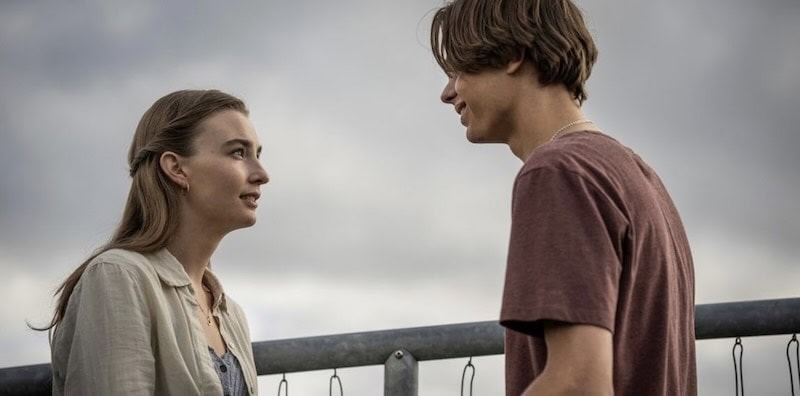Families Like Ours looks at a climate future when Denmark is shut down and abandoned because of rising oceans. The story isn’t about climate change, but about how individual characters respond to the nationwide climate-driven crisis.
Families Like Ours was 7 episodes of emotional agony. This was a different kind of refugee and immigration story for several reasons. The characters were well-off privileged white people with few survival skills. The government itself organized the situation by providing papers, destinations, transportation, and aid to its citizens to relocate them. The story looked at one related group of people and how various members of that family reacted to the upheaval in their lives.
This series was a difficult watch. Not so much because of the dystopian future, but because the characters had no experience with hardship and survival. They made so many bad decisions and choices it was infuriating.

Most of the main characters are shown on the poster above. I’ll explain who they are. Jacob (Nikolaj Lie Kaas) was married to Amalie (Helene Reingaard Neumann). They had a young son. Laura (Amaryllis April Maltha Augus), who was the central character, was 18. Jacob was her father. Her mother Fanny (Paprika Steen) was a former journalist on leave because of stress.
Early in the series, Laura forms a romantic relationship with Elias (Albert Rudbeck Lindhardt). This first love became a driving force in decisions that were made when it was time to leave Denmark. The other big factor in Laura’s decision making was regarding her mom who was to be sent to Bucharest by herself.
Amalie’s brother Nikolaj (Esben Smed) worked for the Danish government. He was married to Henrik (Magnus Millang). Nik shared his insider knowledge of what was coming with his husband and his sister so that they could try to sell their properties before the bottom dropped out of the real estate market.
Jacob was an architect. He had a potential job in Paris. The family got the paperwork to go to Paris. Nik and his husband would go to London to continue in government. Fanny would go to Romania. Elias, who was half Finnish, was supposed to go with his family to Finland. They had the proper paperwork and departure schedules to match these plans.
But it didn’t happen that way.

Decisions were made based on love and emotion rather than good sense. People were lost, beaten, and one person accidentally murdered someone.
Danish director Thomas Vinterberg directed every episode and was one of the writers. His decision to make the characters the story rather than the events of climate disaster was a good one. It made for nail-biting tension. I didn’t like the part of the story where young Lucas (Max Kaysen Høyrup), a potential football star, was given psychic powers of prophecy that affected Laura and her decisions. The series is labeled sci-fi, but it’s really not. It’s too real to call it sci-fi when we know this kind of future is on the way. Adding in the mind-bending abilities of an unrelated schoolboy dragged me out of the story.
The acting was top-notch. The directing was excellent with numerous locations around Europe that seemed real. The music was fitting and often beautiful. But it was definitely a heavy series to watch.
If you’re interested in this well-done drama, the entire series is available now on Netflix. Let me know what you think if you watch it. The comments are open.

Leave a Reply